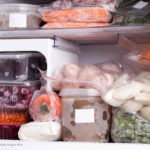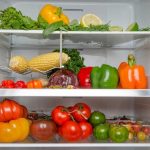It's the first full da of summer, so it's appropriate that we discuss charcoal grill safety tips from the U.S. Consumer Product Safety Commission. The second part of this discussion will cover food safety when grilling, which mostly involves using a thermometer, safe final internal food temperatures, and washing plates and utensils while cooking. Charcoal bags now have a food safety label, indicating that the use of that product is a carbon monoxide hazard. Put bluntly, burning charcoal inside can kill you. This heat source gives off carbon monoxide as it burns, which has no odor. Never ever burn charcoal inside homes, vehicles, or tents. In fact, you shouldn't even grill on a porch that has a ceiling. Furthermore, do not bring a charcoal grill inside the house to use for … [Read more...]
Don’t Put Frozen Food Outside During Power Outages Even if it’s Cold
There are major power outages in large swaths of the United States as a result of freezing temperatures and severe weather, and some bad food safety advice is circulating. When it's cold outside and you are worried about frozen food thawing and spoiling, you may be tempted to put the food outside to keep it frozen. That's a bad idea. Don't put frozen food outside. Even if there's snow on the ground and icicles hanging from your roof, outside temperatures can vary wildly. Frozen food is only safe if it stays below 0°F. Snow and ice will be present on the ground until the air temperature gets above 32°F, and even warmer temperatures than that. This fluctuation can cause thawing and freezing in your frozen food, causing loss of quality and perhaps even the growth of pathogenic … [Read more...]
Food Safety Advocates Want Mandatory Meatpacking Worker Safety
Food safety advocates Food Chain Alliance and the Center for Food Safety filed a petition against the Occupational Safety and Health Administration (OSHA) to implement mandatory meatpacking worker safety. Many employees at meatpacking plants and slaughterhouses have contacted coronavirus. Some plants have closed because of these illnesses, triggering worries about meat shortages. Center for Food safety states, "OSHA has a duty to issue an emergency temporary standard to protect workers from new hazards that pose a grave danger to health and safety. The COVID-19 pandemic is certainly a grave threat to human health, but OSHA has only suggested that meat companies comply with voluntary safety standards." Ryan Talbott, staff attorney at Center for Food safety said in statement, "If … [Read more...]
Feds Investigating Six Meatpacking Plants After COVID-19 Outbreaks
Federal regulators are investigating six meatpacking plants after large COVID-19 outbreaks have been linked to those facilities. The plants include JBS Packerland in Green Bay, Wisconsin, American Foods Group in Green Bay, Smithfield Foods in Cudahy, Wisconsin, and Salms Partners in Denmark, Wisconsin, Pizza crust manufacturer TNT Crust in Green Bay and Birds Eye Foods in Darien, Wisconsin are also being investigated, according to Wisconsin Public Radio. Meatpacking and meat processing plants have become hotspots for coronavirus illnesses in the past few weeks. Smithfield Foods in South Dakota had to close last week after 300 employees were sickened by the virus. One of the issues with these facilities is that employees have to work in close contact with each other. Employees have … [Read more...]
COVID-19 Outbreaks at Meatpacking Plants Increase Food Supply Concern
While the USDA and FDA reassure the public that the shortages they are seeing in grocery stores are primarily the result of panic buying and shortage and not due to problems in the supply chain, other consumer advocate groups are increasingly concerned. COVID-19 outbreaks at meatpacking plants across the country are decreasing supply. That doesn't mean that you have to start hoarding pork, beef, and chicken. It's an acknowledgment that those workplaces may be at higher risk for coronavirus hotspots. They are considered an essential service and need to remain open during the pandemic. So COVID-19 outbreaks at meatpacking plants are a concern. At least 13 processing plants around the country have closed in the past few weeks because so many employees have contracted this illness. … [Read more...]
Smithfield Foods Closes Sioux Falls, SD Plant For COVID-19
Smithfield Foods is announcing that it is closing its plant in Sioux Falls, South Dakota indefinitely because it is a hot spot for COVID-19, otherwise known as coronavirus. Almost 300 of the plant's employees have tested positive for coronavirus. This one plant provides about 5% of the nation's pork supply. South Dakota Governor Kristi Noem sent a joint letter to the company along with Sioux Falls Mayor Paul TenHaken, asking that they "do more" about the pandemic and recommending that they shut down for 14 days. Sioux Falls has more coronavirus cases per capita than larger cities such as Chicago. While public health officials continue to reassure the public that the food supply in this country has not been reduced or harmed by the pandemic, Kenneth M. Sullivan, president and … [Read more...]
Meat Processing Facilities Close As Workers Get Sick With COVID-19
This news isn't going to help with the hoarding problem in this country because of the COVID-19 pandemic, but several meat processing facilities close around the country as their workers start getting sick with coronavirus, according to NPR. Food workers are categorized as essential workers during the pandemic. Tyson Foods has suspended operations at its pork plant in Columbus Junction, Iowa. National Beef Packing, also located in Iowa, stopped production as well. And JBS USA temporarily closed a beef processing plant in Pennsylvania. JBS USA also confirmed the death of one employee at a facility in Colorado. Three employees at the Tyson Foods poultry plant in Camilla, Georgia have died of COVID-19, according to the New York Times. Because of these illnesses and deaths, it's … [Read more...]
Do You Know How Long Foods Can Be Stored in the Fridge or Freezer?
Because of the coronavirus pandemic, many people are buying more food than they can eat in a week, or even in a month. While hoarding food is not helping the situation, these actions can help people feel safer. While nonperishable foods such as canned and shelf-stable products can be stored without worrying about food safety, do you know how long foods can be stored in the fridge or freezer? Foodsafety.gov has the answer with a chart. First, a note about expiration dates. Most of these dates, especially for canned foods or shelf stable foods, refer to the quality of the food, not to possible bacterial contamination. So if you have a can of peas that are past the "best if used by" date stamped on the can, you can still eat them; the peas just won't have a good color and the flavor … [Read more...]
Use High Heat to Cook Meat? Rethink That Technique
A new study published in the journal Cancer has found that cooking beef at high temperatures may lead to an increased risk of developing kidney cancer. Carcinogenic compounds are created in the meat when grilled, barbecued, and pan-fried. The study was conducted at the University of Texas MD Anderson Cancer Center. Renal cell carcinoma affects 60,000 new patients every year. About 14,000 people die of this illness every year in the Untied States. The incidence of this type of cancer has been increasing for decades. Dr. Stephanie Melkonian, Epidemiology postdoctoral fellow and lead author of the study said, "this study encourages us to look not only at what foods we're eating, but also how we're preparing those foods." When you cook meat with high temperature, causing charring on the … [Read more...]











